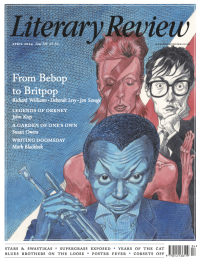Julia Jordan
Called to Account
Tell
By Jonathan Buckley
Fitzcarraldo Editions 200pp £12.99
There is a deep-seated, if perhaps unexpected, affinity between storytelling and accountancy. To tell a story is to recount it, and a ‘teller’ usually works at a bank; tales and their tellers have always had a relationship with matters of counting, balancing and reckoning. Tell, the remarkable new novel by Jonathan Buckley, the co-recipient of the 2022 Novel Prize, is concerned with assessment and measurement. Any sort of precision, it suggests, is fundamentally at odds with the business of storytelling.
The novel concerns a very rich man, Curtis Doyle, and the various attempts made to weigh – or account for – his life. Doyle’s family, houses, art collection and staff – including those tasked with telling stories about him – fan out around him. The story is ostensibly narrated by Curtis’s gardener, whose testimony appears to be directed at a silent interlocutor who will later tell a new version of the story. Another character, Lara, is writing about Curtis, and her status as chronicler affords her certain privileges. Narrative intimacy pays. ‘Telling’ is also contained in ‘foretelling’, and this is a book ruled by the teasing mechanisms of prolepsis – ‘We’ll come on to it later.’ Not that these promises of enlightenment are ever fully realised. The narrator consistently emphasises his or her own partiality and limitations as a guide in asides like ‘the water’s too deep for me’ and there’s a formal counterpart in the frequently scattered notations ‘[Indistinct]’ and ‘[Inaudible]’ in the transcripts. Curtis eludes everyone – his reckoners and the reader.
Tell is an undeniably slight book. Slightness is sometimes understood as a negative attribute in novels, which can seem to aspire to the large-scale, the explanatory or the historically or culturally detailed. But Buckley has succeeded in developing an aesthetic of slightness: his is writing designed to slip

Sign Up to our newsletter
Receive free articles, highlights from the archive, news, details of prizes, and much more.@Lit_Review
Follow Literary Review on Twitter
Twitter Feed
Under its longest-serving editor, Graydon Carter, Vanity Fair was that rare thing – a New York society magazine that published serious journalism.
@PeterPeteryork looks at what Carter got right.
Peter York - Deluxe Editions
Peter York: Deluxe Editions - When the Going Was Good: An Editor’s Adventures During the Last Golden Age of Magazines by Graydon Carter
literaryreview.co.uk
Henry James returned to America in 1904 with three objectives: to see his brother William, to deliver a series of lectures on Balzac, and to gather material for a pair of books about modern America.
Peter Rose follows James out west.
Peter Rose - The Restless Analyst
Peter Rose: The Restless Analyst - Henry James Comes Home: Rediscovering America in the Gilded Age by Peter Brooks...
literaryreview.co.uk
Vladimir Putin served his apprenticeship in the KGB toward the end of the Cold War, a period during which Western societies were infiltrated by so-called 'illegals'.
Piers Brendon examines how the culture of Soviet spycraft shaped his thinking.
Piers Brendon - Tinker, Tailor, Sleeper, Troll
Piers Brendon: Tinker, Tailor, Sleeper, Troll - The Illegals: Russia’s Most Audacious Spies and the Plot to Infiltrate the West by Shaun Walker
literaryreview.co.uk